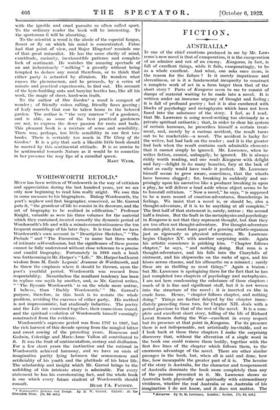SENSE AND SENSIBILITY OUT OF DOORS.*
ONE can gauge a character by its attitude to Nature. From the imaginative to the starkly realistic is a far cry, yet there are true lovers of earth in both camps. Each of us, wandering in a wood, creates it, and these woods that we make arc as diverse and as many as the flowers in a hedgerow. To the hunter the wood is a place of tracks and spoors, faint foot- marks, secret dens—the place that conceals or reveals his quarry. So Mr. MeConnochic regards it.' In his fas- cinating account of the Scotch forests, with their sweet- sounding names and their ancient mystery, one is always conscious that the primary absorption of the author is sport, and that on the next page something will probably be killed. Still, shooting is the most merciful of sports, and deer- stalking is a brave antique craft, and has nothing in common
(Continued on page 466.)
• (1) The Deer and .Deer Forests of SeoUand. By A. lnkson McConnochle, London: Witherby. net.]---(2) A Naturalist in Ilindudan. By Major R. W. G. Ilingston, M.C., M.B., I.M.B.London: Witherby. 116s. net.)—(3) One Garden. By D. H. Moutray Read. London : Williams and Zionists. 112e. dd. net.]—(4) The Glory of the Garden. By G. Kennedy-Bell, F.R..H.S. London : Black. [So. Oct.]
with the ignoble and cruel pursuits so often called sport. To the ordinary reader the book will be interesting. To the sportsman it will be absorbing.
To the scientist a wood is the abode of the especial fungus, flower or fly on which his mind is concentrated. Fabre had that point of view, and Major Hingstont reminds one of that great naturalist. He has the same clarity of mind, exactitude, curiosity, inexhaustible patience and complete lack of sentiment. He watches the amusing spectacle of an ant industriously " milking " a greenfly without being tempted to deduce any moral therefrom, or to think that either party is actuated by altruism. He wonders what causes the phenomenon, and he proceeds, by a series of minute and practical experiments, to find out. His account of the byre-building ants and burying beetles has, like all his work, the magic of sheer, hard-won truth.
To the author of One Garden' a wood is compact of wonder ; of friendly voices calling, friendly faces peering ; of leafy marvels that can be taken home to the beloved garden. The author is " the very marrow " of a gardener, and is able, as some of the best practical gardeners
are not, to express the dewy passion for roots and buds. This pleasant book is a mixture of sense and sensibility.
There was, perhaps, too little sensibility in our first two
books. There is certainly too much in The Glory of the Garden.' It is a pity that such a likeable little book should
be marred by this sentimental attitude. It is as unwise to be sentimental towards Nature as it would be to sonnetize in her presence the rosy lips of a cannibal queen.
MARY WEBB.











































 Previous page
Previous page